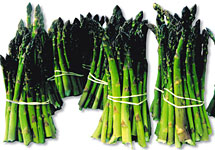MLUI / News & Views / Articles from 1995 to 2012 / An Ode to Asparagus and Local Food
An Ode to Asparagus and Local Food
Empire's new tradition aims to restore an ancient one
July 7, 2004 | By Patty Cantrell
Great Lakes Bulletin News Service
EMPIRE — Last month residents of this tiny village celebrated the return of spring and all things green with a good old-fashioned farm festival. The odd thing is, 2004 is the first year of what intends to be the annual Empire Asparagus Festival. This village along the northern Lake Michigan coastline launched the tradition to have fun, but the festival also hopes to redefine Empire as a place where farming and good local food will always be. 
Although asparagus is hardly the top crop in this area around the Sleeping Bear Dunes National Lakeshore, it is the first crop to emerge after six long months of winter. Those tender stalks of green and purple reaching up out of the bare ground for a blanket of hollandaise sauce are reason enough for Empire residents — known for bowling on their snow-packed main street — to throw a party.
So Empire declared its love of local foods and family farming with an “Ode to Asparagus” poetry contest, a cream-of-asparagus soup feed, and special items — like sesame tempura fried asparagus — on the menu of The Friendly Tavern. The village’s new, old-time farm festival is a harbinger of a positive change for rural areas that haven’t given up on enjoying local farming’s bounty.
The festival draws attention to the fundamental role farming plays in the area’s treasured rural lifestyle, said festival organizer Ashlea Turner, by sharing the joy of breaking the winter food blues with asparagus from a neighbor’s farm. One of those neighbors, 88-year-old Julia Norconk, sees this joy every day of asparagus season, when cars arrive non-stop to buy fresh-picked spears from her son Harry’s roadside stand south of Empire. “It’s the first green thing in the spring, and they’re after it,” she said.
Resurrecting Local Foods
 | |
| Gene Turner | |
| The Empire Asparagus Festival celebrates spring’s first bounty and is a reminder that local food can be a key to local prosperity. |
Empire is not alone in wanting to turn back towards a viable local farm economy. Leaders across the nation are taking stock of farming’s value to local landscapes and economies. They are marketing local flavors to new consumer tastes, rather than simply producing more volume for glutted mass markets, with new initiatives that reconnect farms with local markets. Last year, for example, the state and family farm groups put in-season asparagus on the shelves of Grand Rapids supermarkets that typically imported their stock from Washington State and Ontario.
Such initiatives trigger other ones. This year northwest Michigan will have its own local food marketing effort, Select a Taste of Traverse Bay. Produced by the Michigan Land Use Institute, the guide helps families, chefs, vacationers, and others find and buy from more than 140 local farms offering everything from artificial-hormone-free beef to goat sausage and cherry pies. The guide is also searchable online.
A Growth Market?
The Norconk operation, listed in the new guide, markets 40 acres of asparagus at two roadside stands, the Traverse City Farmers Market, restaurants, and two grocery chains. Five years ago Mr. Norconk sold 90 percent of the crop wholesale to canneries. He switched to direct marketing when imports flooded the canned market and drastically lowered prices.
“It was either change modes fast, or look for another job,” Mr. Norconk said. The new mode, he said, required him to “jump in with both feet and started selling fresh asparagus anywhere and everywhere.”
It has been worth all the extra wrangling; he said his farm now sells 40 percent of its crop to local fresh markets, with hopes for more as more people demand the taste of fresh-picked local asparagus. He gets twice the price that the canned asparagus market pays this year, and as much as three times what it paid when the market was flooded.
If area chefs thought more about local foods they could double or triple their orders, said Mr. Norconk. He hopes local appreciation for fresh asparagus grows to the point that all local restaurants feature asparagus dishes during May and June. The Friendly Tavern’s Frank Lerchen says he has occasionally served local asparagus as a side dish but has not generally featured it on his menu before: “But if we get a good response to the entrees we’re doing for the festival this weekend, we could in the future. Our customers will let us know.”
Reach Patty Cantrell, director of the Institute’s Entrepreneurial Agriculture Project, at patty@mlui.org. Select a Taste of Traverse Bay is available online at www.mlui.org/foodguide.





